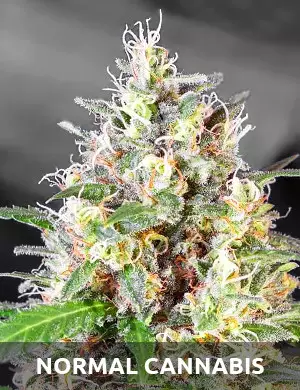
What Are Cannabis Foxtails? Everything You Need To Know About Foxtailing & Growing Weed
Last updated: 20 November 2020

Foxtail is a cannabis term that the average user might not be all that familiar with but which most growers are, since it’s a sign of abnormal growth with their crop. What both groups should know is that cannabis foxtails are more than just a variance in appearance, and can also affect the potency of your bud. It’s like wearing pigtails and technically having a hairstyle that’s ‘done’ but isn’t the best it could be. Even though marijuana foxtailing isn’t the end of the world, it’s not the best-case scenario for consumers or growers and therefore should be avoided. So, what do foxtails look like, what is this exactly, and what should you know about it? We’ll answer these questions and more in this guide to cannabis foxtailing.
Disclaimer: This content is intended for use in regions where cannabis cultivation is legal. Please ensure compliance with your local laws and regulations before growing cannabis.
What Are Cannabis Foxtails?

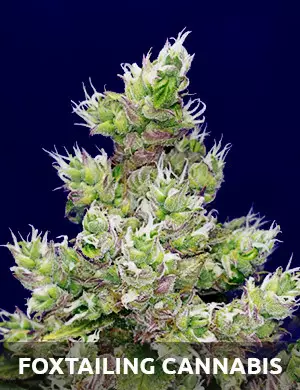
Before we get into the abnormalities of foxtailing cannabis, let’s fully understand how normal cannabis buds should grow. When you imagine cannabis in its finest form, you probably envision dense, bulbous nugs in a uniform or familiar ‘bud’ shape. In terms of growing, you watch marijuana flowers bloom evenly from bud sites into strong groups of gathered nugs. Technically speaking, these are calyxes, or seed sites that bloomed into the buds like they normally should. The calyxes grow evenly together, tall and wide, forming the voluminous nugs we’ve all grown to love.
With marijuana foxtailing, however, the end bud appearance is a different story. You see, cannabis foxtailing occurs when the calyxes grow on top of one another. Instead of growing into round, voluptuous buds, cannabis foxtails are elongated growths that are tall and skinny, breaking up the normal ‘nug’ shape. So why should growers and consumers care about cannabis foxtailing? Because the abnormal growth means there’s less of the end-product, and less potency as well.
Disclaimer: Please note that the information about growing techniques and THC content here and below is based on grower experiences and shouldn’t be seen as scientific claims.
A Tale Of Types: What Causes Cannabis Foxtailing?
There are a few different factors that cause foxtailing, which in itself has spawned different ‘types’ of foxtail definitions. Even though cannabis foxtailing isn’t normal, there’s still a ‘good’ and a ‘bad’ type of this abnormality. Let’s cover why and how foxtailing cannabis occurs to get to know the variations better.
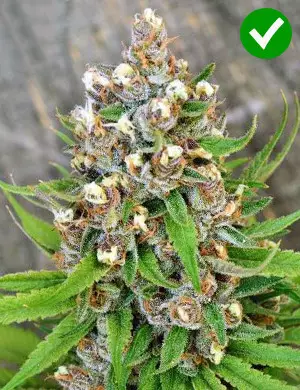
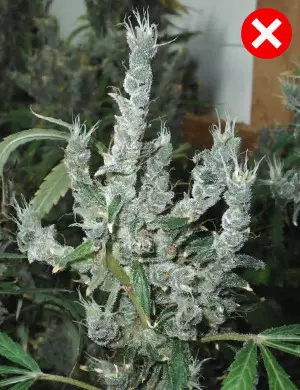
‘Good’ Foxtailing (Leave It As It Is)
The ‘good’ type of foxtailing is when the irregular growth comes from the genetics of the plant, meaning that the strain with foxtailing buds may be genetically set or predisposed to do so. Growers report that some cannabis strains are just prone to foxtailing. Among those are Blue Cheese and Neville’s Haze. These types of foxtail flowers will be found throughout the plant and in a more uniform nature rather than being randomly distributed or irregular in their growth. This is considered ‘good’ foxtailing, as it doesn’t affect the potency of the plant; high levels of THC can be reached regardless of the bud shapes.
‘Bad’ Foxtailing (Something Has To Be Fixed)
The ‘bad’ type of foxtailing is caused by light or heat stress. Because your plant is stressed, it grows abnormally in terms of its shape and, therefore, potency. So, for ‘bad foxtailing’, the effects are much more detrimental than the ‘good’ one. Instead of uniform buds, flowers of foxtailing cannabis are more like less potent spires or branches extending upward or pistils growing on top of one another in a straight line. This reduces the area of your cannabis bud and means its overall quality will be affected.
Now that we know what causes foxtailing and what the foxtail flower types are, we can get to preventing the flaw from occurring at all.
Prevention Tips For Cannabis Foxtailing
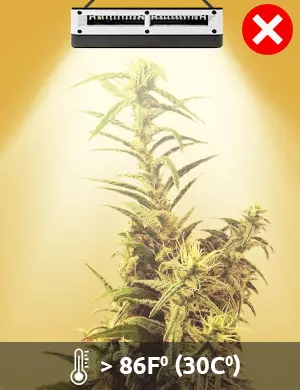
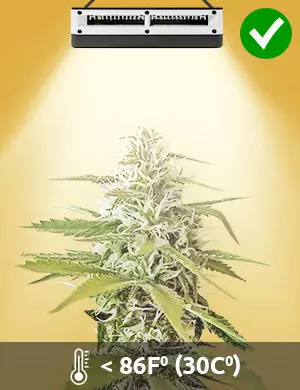
Luckily, by monitoring and regulating a few environmental factors, you can avoid foxtailing cannabis altogether (unless, of course, you’ve chosen to cultivate a genetic that’s just prone to foxtailing buds). If not, here are a few tips to avoid marijuana foxtailing.
Maintain Ideal Temperatures
Bad foxtailing can be a sign of stress from overheating. So, make sure you’re monitoring your temperatures and reducing when necessary – if your daytime temperatures are above 86F (30C), it’s a good reason for the plant to start foxtailing.
Monitor Light Distance
Since cannabis plants grow toward the light, it’s imperative to ensure proper distancing between the plants and the light source. Don’t let the plant get too close to the source of light – it might get burned and start foxtailing. The easy way to check if the distance to the light is safe is by placing the palm of your hand where the cannabis plant is the closest to the bulb. If it’s hot for you, it’s hot for the plant as well. Monitoring your light height as plants mature and raising it when necessary can help to avoid foxtailing cannabis.
Reduce Stress
Any type of stress or deficiency can cause a plant to grow abnormally, so reducing stress is ideal for avoiding foxtailing buds in addition to carefully monitoring heat and lights. A good tip here is to keep a journal with every action you take in cultivating your cannabis plants and their reactions. This will make it much easier to detect the source of the problem if one appears.
Final Thoughts On Foxtailing
Let’s be honest, most top-shelf strains don’t have foxtail flowers. While foxtailing has a ‘good’ and ‘bad’ type, neither are ideal. While some strains are just genetically predisposed to foxtailing, for others, it’s a sign of stress or struggle in the growth process. For growers, it’s therefore best to take the precautionary tips we’ve provided to avoid the abnormality altogether. As for consumers, you may want to avoid foxtailing buds with their lower potency unless you put some research into the specific strain to know if the reason is purely down to genetic predisposition.
Herbies Head Shop expressly refuses to support the use, production, or supply of illegal substances. For more details read our Legal Disclaimer.
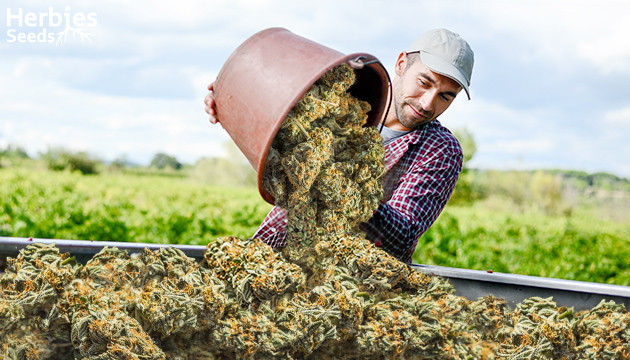










Thank you for leaving a comment for us!
Your feedback will be posted shortly after our moderator checks it.
Please note that we don’t publish reviews that: